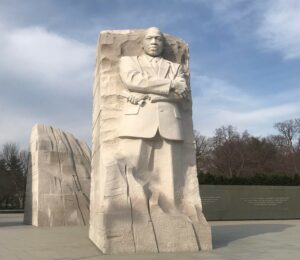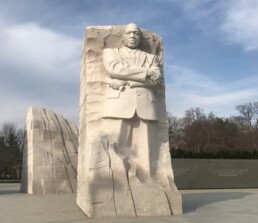Voting is King

"If you don't vote, you don't count".
-Fannie Lou Hamer
Dr. Martin Luther King, Jr. was a courageous Civil Rights leader who inspired millions of people to use love as the highest principle for social reform. As we pause to honor his life and legacy, let us remember his lifelong passion and commitment to securing equality for all Americans through political representation. In a 1957 speech titled "Give Us The Ballot," Dr. King spoke about the need for equal voting rights:
"So long as I do not firmly and irrevocably possess the right to vote I do not possess myself. I cannot make up my mind — it is made up for me. I cannot live as a democratic citizen, observing the laws I have helped to enact — I can only submit to the edict of others."
In March 1965, Martin Luther King Jr. vowed to continue fighting for the right to vote:
“Let’s march on ballot boxes until race-baiters disappear from the political arena. Let us march on ballot boxes until the salient misdeeds of bloodthirsty mobs will be transformed into the calculated good deeds of orderly citizens.”
Five months later, the Voting Rights Act became law to prohibit tactics designed to eradicate the African American vote. Within months of its passage, a quarter of a million new Black voters had been registered. Within four years, voter registration in the South had more than doubled. In 1965, Mississippi led the nation in both African American turnout –74 percent–and the number of African American leaders elected. By 1969, African American voter turnout in Tennessee was 92.1 percent; Arkansas, 77.9 percent; and Texas, 73.1 percent.
Dr. King’s resolution to fight for voting rights resonates now more than ever. In 2024, as we honor Dr. King on his birthday, voting rights are under siege beset by a wave of attacks. Unabashedly lawmakers nationwide, with the support of a conservative Supreme Court, have reconstructed barriers to the voting process through copious strategies including discriminatory redistricting, slashing access to early voting and polling locations, particularly in Democratic leaning communities or urban areas, and indiscriminately removing people from the voter rolls, all with intent of weakening the influence and impact of Black and brown voters. Locally, Georgia Republicans are arguing that the end of affirmative action also means that we must eliminate race-based redistricting which will ultimately reduce the influence of Black voters.
As Stacey Abrams stated, “[o]ur ability to participate in government, to elect our leaders and to improve our lives is contingent upon our ability to access the ballot. We know in our heart of hearts that voting is a sacred right - the fount from which all other rights flow.’ Protecting democracy requires a collective effort. Americans must safeguard the democratic principles that the United States is built upon which includes the fundamental right to allow citizens to participate in the decision-making process. We must remain vigilant and work together to defeat all forms of voting restriction measures and other potential threats to democracy particularly when we know the attacks are rooted in racism and an unfettered assault on the freedom and future of the Black community. As we remember Dr. King, we must not rest. In 1965, we were fighting to get the right to vote without coercion and corruption. In 2024, we must fight that we keep it.
Public Lynchings and their Myriad Manifestations
In recent weeks, there has been a hostile maneuver by political activists, religious zealots, and conservatives to dictate who holds leadership roles in universities. Not even the nation’s most esteemed educational institutions are immune from the influence of public opinion and big money.
Despite last month’s vote of confidence from the Harvard Corporation, President Claudine Gay resigned from her position this week, ending a six-month tenure plagued by allegations of plagiarism and, more recently and visibly, backlash over her congressional testimony about antisemitism on campus. Her resignation came after personal attacks from politicians such as Rep. Elise Stefanik, a Harvard alumna, and Harvard donors such as Bill Ackman, a billionaire hedge fund manager.
Some of Gay's critics celebrated her Gay's resignation as a victory to dismantle diversity, equity, and inclusion programs qualifications, arguing that her very appointment was a university strategy to promote diversity.
"It has been distressing to have doubt cast on my commitments to confronting hate and to upholding scholarly rigor - two bedrock values that are fundamental to who I am - and frightening to be subjected to personal attacks and threats fueled by racial animus," Gay said in her statement.
The Harvard Corporation echoed this sentiment and wrote that Gay had been subjected to "deeply personal and sustained attacks" that included "racist vitriol directed at her through disgraceful emails and phone calls."
While Gay’s writing included unintentional citation errors, the institution had resolved the issue and maintained pride and confidence in its leader. Moreover, we proposition the high likelihood that AI software would detect similar errors in works by other university presidents, professors, Congresswomen and even hedge fund executives. Rather, we suggest that the central issue here is the racism faced by Black women in leadership roles resulting from unrealistic standards and expectations than their White colleagues. This racism is exacerbated by a daily barrage of microaggressions, opposition and criticism, designed to dismantle the promise of greater equity in America.
Like many others, we are extremely concerned over the aggressive right-wing attacks on higher education that threatens academic freedom. Detractors have sought to reduce funding for public universities, challenge race and gender discourse in the classrooms, roll back tenure, and eliminate initiatives that make colleges more welcoming to students of color.
According to Rep. Stefanik, Gay’s resignation for plagiarism allegations was “just the beginning of the reckoning” and claimed House Republicans will carry out a “long overdue” cleansing of Ivy League higher education’s “institutional rot.”
It is heartbreaking to consider the lessons students who bear witness to these personal and political attacks. Dr. Gay has been deliberately and publicly lynched. Such malevolence is an affront to us all and demonstrate that none are exempt from the virulence of racism and white supremacy.
